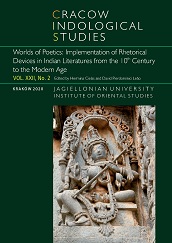The Metaphor of Boundary Crossing in Classical Sanskrit Literature
The Metaphor of Boundary Crossing in Classical Sanskrit Literature
Author(s): Anna TrynkowskaSubject(s): Studies of Literature, Ancient World, Cognitive linguistics, Stylistics
Published by: KSIĘGARNIA AKADEMICKA Sp. z o.o.
Keywords: kāvya; mahākāvya; sargabandha; metaphor; boundary; maryādā; ocean;
Summary/Abstract: The paper deals with the metaphor the non-physical boundaries are physical boundaries in Classical Sanskrit literature (kāvya), especially in the mahākāvya (sargabandha) or the court epic genre. Several selected instances of the usage of this metaphor are analysed here in detail in their various contexts. In the stanzas discussed in the paper, the metaphor is skillfully elaborated by the authors: a man staying within/breaking/crossing the boundaries of law and/or propriety (maryādā) is most frequently metaphorically conceptualized as the ocean, normally staying within the boundaries of its shoreline (maryādā/velā) but violently overflowing them during universal destruction (pralaya).
Journal: Cracow Indological Studies
- Issue Year: 21/2019
- Issue No: 2
- Page Range: 225-237
- Page Count: 13
- Language: English

